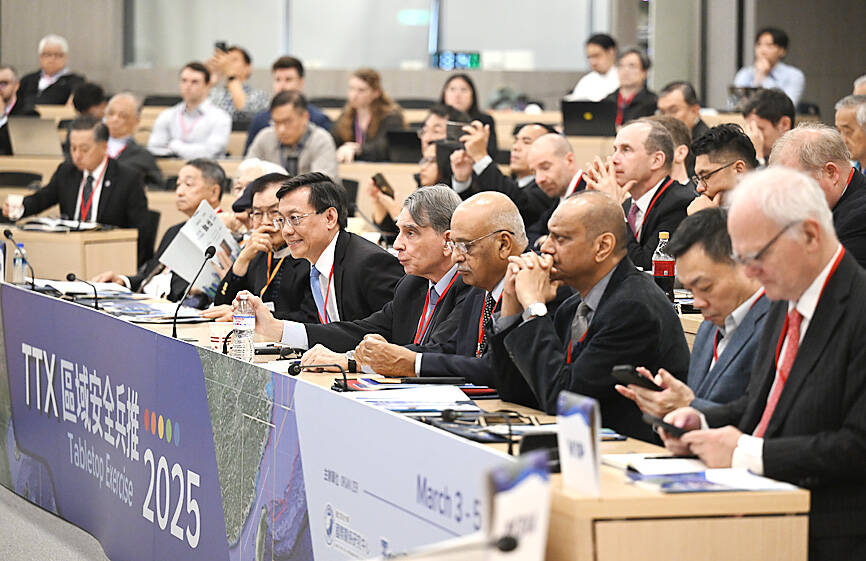A tabletop exercise series has begun simulating possible scenarios if the Chinese People’s Liberation Army (PLA) launched a war against Taiwan in the guise of a military exercise.
The exercise series is jointly organized by National Chengchi University’s Institute of International Relations, Taiwan Center for Security Studies and Asia-Pacific Policy Research Association.
Chinese Nationalist Party (KMT) Legislator Chen Yeong-kang (陳永康), former American Institute in Taiwan (AIT) director William Stanton and Taiwan Center for Security Studies director Liu Fu-kuo (劉復國) attended the event in Taipei yesterday.

Photo: Lin Cheng-kun, Taipei Times
Scenarios that would be simulated include changing political circumstances in the US during US President Donald Trump’s tenure and the PLA’s “gray zone” harassment around Taiwan, such as damaging submarine cables, Liu told reporters.
The series would simulate how people in Taiwan should respond in terms of military, national security, diplomacy and economy if a PLA military exercise turned into an invasion, Liu said.
Despite a rise in cross-strait tensions, the likelihood of China launching an invasion remains low, Liu said, adding that proactive military actions from China are generally launched in coordination with its political moves.
Beijing’s recurring military exercises do not necessarily mean that it would launch an all-out invasion of Taiwan, Chen said.
“Instead they are a strategic act designed to intimidate Taiwanese, put constant pressure on the nation and engage in an attritional battle” to drain its resources, he said.
Chen said that the purpose of the exercise series is to identify strategies for the government to implement to control risks and prevent war, adding that Taiwan’s social resilience and military defense capabilities should also be bolstered.
Stanton said former president Tsai Ing-wen’s (蔡英文) decision to restore mandatory military service to one year was the right one, but it would be more appropriate to extend it to two-years of service given the potential threat facing Taiwan.
“We hope to see a stronger Taiwanese military and less political division ... Now is not the time for politics,” he said.
Taiwan should take advantage of its status in the semiconductor industry and win over support from other countries, Stanton said.
Asked if Taiwan would be in a situation similar to that of Ukraine, Stanton said that US Secretary of State Marco Rubio has expressed strong support for Taiwan, while Trump refused to say explicitly what he would do in a cross-strait conflict.
Trump understands that he would have to handle his relations with Chinese President Xi Jinping (習近平) and has strategic considerations, he said, adding that a free and democratic Taiwan is worth the support from the US.
Regarding how to learn from the Ukrainian military, Chen said what worked for Ukraine might not work for Taiwan, but it should learn from the failures of the Ukrainian military.
Seeing how the US and Ukraine interacted should remind Taiwan to bolster its own capabilities in handling cross-strait conflicts, he said.
“Not only must we maintain our relations with the Trump administration, but we must strive to pursue peace and stability across the Taiwan Strait,” he said.

The Taoyuan Flight Attendants’ Union yesterday vowed to protest at the EVA Air Marathon on Sunday next week should EVA Airway Corp’s management continue to ignore the union’s petition to change rules on employees’ leave of absence system, after a flight attendant reportedly died after working on a long-haul flight while ill. The case has generated public discussion over whether taking personal or sick leave should affect a worker’s performance review. Several union members yesterday protested at the Legislative Yuan, holding white flowers and placards, while shouting: “Life is priceless; requesting leave is not a crime.” “The union is scheduled to meet with

‘UNITED FRONT’ RHETORIC: China’s TAO also plans to hold weekly, instead of biweekly, news conferences because it wants to control the cross-strait discourse, an expert said China’s plan to expand its single-entry visa-on-arrival service to Taiwanese would be of limited interest to Taiwanese and is a feeble attempt by Chinese administrators to demonstrate that they are doing something, the Mainland Affairs Council said yesterday. China’s Taiwan Affairs Office (TAO) spokesman Chen Binhua (陳斌華) said the program aims to facilitate travel to China for Taiwanese compatriots, regardless of whether they are arriving via direct flights or are entering mainland China through Hong Kong, Macau or other countries, and they would be able to apply for a single-entry visa-on-arrival at all eligible entry points in China. The policy aims

EVA Airways president Sun Chia-ming (孫嘉明) and other senior executives yesterday bowed in apology over the death of a flight attendant, saying the company has begun improving its health-reporting, review and work coordination mechanisms. “We promise to handle this matter with the utmost responsibility to ensure safer and healthier working conditions for all EVA Air employees,” Sun said. The flight attendant, a woman surnamed Sun (孫), died on Friday last week of undisclosed causes shortly after returning from a work assignment in Milan, Italy, the airline said. Chinese-language media reported that the woman fell ill working on a Taipei-to-Milan flight on Sept. 22

COUNTERMEASURE: Taiwan was to implement controls for 47 tech products bound for South Africa after the latter downgraded and renamed Taipei’s ‘de facto’ offices The Ministry of Foreign Affairs is still reviewing a new agreement proposed by the South African government last month to regulate the status of reciprocal representative offices, Minister of Foreign Affairs Lin Chia-lung (林佳龍) said yesterday. Asked about the latest developments in a year-long controversy over Taiwan’s de facto representative office in South Africa, Lin during a legislative session said that the ministry was consulting with legal experts on the proposed new agreement. While the new proposal offers Taiwan greater flexibility, the ministry does not find it acceptable, Lin said without elaborating. The ministry is still open to resuming retaliatory measures against South